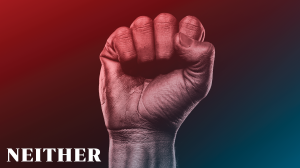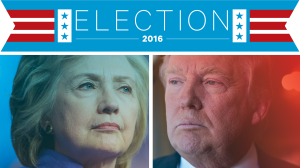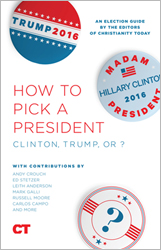In this series

As a black Christian in an urban environment, I consciously struggle to give my allegiance to either political party. In this way, this election gives many white evangelicals a sense of what it’s like to be a black believer in America today.
As an African American, I’m marginalized by the lack of compassion on the Right. As a Christian, I’m ostracized by the secularism of the Left. As a man, I’m greatly concerned by subversive attempts to deconstruct all “classical” definitions of manhood.
I fraternize with a remnant of people who have the cultural and theological aptitude to engage both Carter G. Woodson and G. K. Chesterton. We walk the tightrope between conservatives and progressives. We share an anxiety and sense of displacement in the current sociopolitical landscape.
I have had zero interest in either candidate this election. Many people are fearful about the next president, as they should be. Our newly appointed chief will likely nominate Supreme Court justices. The thought of either candidate appointing justices scares me. Many Clinton supporters seek a secular utopia that progresses past logic. Many Trump supporters want to resurrect bigoted ideologies. Neither of these Americas is great to me.
True Liberation
Ideally, fellow black Christians and I could thrive at the table with conservatives because we agree on a moral code. But it has been shocking to see some conservatives perform verbal gymnastics to support a candidate who has questionable character and vacillates on basic conservative principles.
Further, many of our conservative brothers and sisters have justified or ignored the deaths of Tamir Rice, Trayvon Martin, Michael Brown, and other young black men. Many claim their Republican values align with their faith, but are supporting someone who looks more like Bull Connor than Billy Graham.
Yet both Republicans and Democrats have supported policies that have only increased the plight of minority communities. In the War on Drugs, leaders from both parties supported draconian penalties for nonviolent drug offenses. Those leaders have financially benefited from disproportionately sending folks to prison for crimes that carry far fewer consequences in affluent communities. Only recently has America witnessed what could be called the “gentrification of the drug crisis,” wherein opioid addiction among whites is reaching epidemic levels. Bill Clinton’s Crime Bill of 1994 escalated the arrests of people of color for nonviolent crimes. He later admitted that signing the bill was a mistake. Although I’m grateful for this revelation, some of us have carried the burdens of its implications all our lives.
I live in a part of Atlanta where African Americans make up 79 percent of the population, according to census data. If you live in a community with these demographics, you’re most likely grappling with underperforming schools, anemic business districts, scarce home ownership, and nihilistic behaviors.
Many Clinton supporters seek a secular utopia that progresses past logic. Many Trump supporters want to resurrect bigoted ideologies. Neither of these Americas is great to me.
If I’m sensitive to this plight, then I’m compelled to partner with those who have a burden to fix these broken policies and systems. When it comes to addressing those issues, it appears that Democrats show the most compassion and desire to try to fix these problems. Yet I fear that many of our liberal pundits and activists apply wrong means that lead to a calamitous end. I often wonder if they truly want to see these communities restored and liberated. I’m even more concerned about what type of restoration and liberty they desire.
There is a distinct difference between the restoration and liberation we need and what we want. If secular humanism and all of its tenets are at the end of the liberation rope, then I refuse to grab hold. I will die a slower, more humiliating death once I’m pulled into that boat. I’d rather face my opposition knowing I never sacrificed my dignity and beliefs. I am made in the image of God. I will not forfeit that for pseudo-liberation. And liberation absent of God is no liberation at all.
If the black Christian doesn’t rise up with a distinct political vision, then we will find our communities under the authority of secularism. As Reformed Theological Seminary scholar Carl Ellis Jr. has noted, “Ethical content could have saved the Black Power movement. But the leaders had already swallowed secular humanism. Thus all moral decisions were left up to the individual.” Individualism in a postmodern society has destructive intentions aimed at the foundations of Christian orthodoxy and natural law.
Is there any doubt that our allegiance is with the Democratic Party when the black vote has been no less than 84 percent Democrat in the past 20 years? We can discard our platitudes about keeping politicians honest when they know they have us in their pockets. Why should they submit to accountability when they know we will return to them no matter what they do? (This is not a new problem in the black community. Malcolm X’s speech “The Ballot or the Bullet” addressed this blind loyalty, labeling “political chumps” those fellow blacks who support white politicians who nonetheless put black communities’ needs last.)
I believe there is a third way. Urban Christians are determined to reassert ourselves into the political arena. We refuse to settle for civic engagement that forces us to either neglect our compassion or surrender our convictions. From mass incarceration to the right to life for the unborn, it’s time to engage in advocacy that better reflects the love and truth of the gospel.
Compassion and Conviction
Allow me to quote Ellis once more:
I believe that if we are going to move forward as a community who has distinctive concerns in America, we need to evaluate political and social ideas as they stand on their own, without regard to their ideological association.
I believe that soon there will be a movement of folks who protest both police brutality and abortions without feeling disloyal to one party or the other. These Christians comprehend an unabridged concept of life, that it is to be protected from the cradle to the grave. This is a comprehensive outlook that seeks justice in community development, education, prison reform, and job creation. These people recognize honoring humanity is a service to God and not a partisan policy.
It would be naïve to think that urban Christians are the only people who feel this disconnect. Not all Republicans are callous legalists; not all Democrats are immoral despots. I find great utility on both sides. However, who better than Christians, who have experienced persecution of all kinds, to display both compassion and conviction? Out of that experience comes the capacity to love recklessly while inviting people to a new standard.
Christ is our model of compassion and conviction. He loved Zacchaeus enough to sup with him, knowing the social stigma attached to his occupation. Zacchaeus adopted a new worldview in response to his encounter with Jesus. This worldview taught that exploiting citizens and perpetuating a system that hurt the poor was no longer an option.

Christ loved the adulterous woman enough to save her from execution. He not only cared for her immediate need but loved so perfectly that he invited her to leave a life of sexual exploitation. This is the ever-elusive balance we must try to occupy. We must show great compassion while holding to our firm convictions. We believe that the Lord can change both our hearts and our circumstances.
Instead of encouraging urban Christians to vote for a false choice this election season, my hope is that we will build a strong base, similar to the Tea Party and the LGBTQ community, that will garner attention from lobbyists, lawmakers, and pundits. The goal is to transcend political parties so that they will no longer be an obstacle. This was the posture of the civil rights movement.
This will mean endurance to cause political disruption. We have been silenced by liberal lobbying and frustrated with conservative complacency. Do we have the endurance of our predecessors to campaign for 384 dreadful days until we see political change, as did the Montgomery Bus boycotts?
This will mean empathy. Though we have a heart for the truth of God, we must not divorce our ethical leanings from compassion for others.
This will mean education for our communities on the policies that will bring substantive change and liberty. Governance and policymaking are not results of the Fall but part of what God intended for humans all along. So sin does not negate our responsibility to be cultivators, as artists, pastors, jurists, teachers, parents, cashiers, or students. We are a city on the hill that can no longer lease our lot and escape to a quieter place.
Sho Baraka is a hip-hop artist with Humble Beast Records and a founding member of the AND Campaign.














